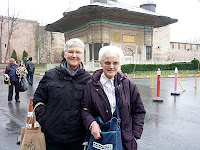A
lecture series at Corpus Christi,
MANIFOLD GREATNESS: OXFORD CELEBRATIONS OF THE KING JAMES BIBLE 1611-2011 begins January 25th, 2011:-
Hilary Term 2011
Tuesdays in the Auditorium, Corpus Christi College, 5.30 pm
(Choral Evensong will take place in the College Chapel)
25 January
Prof Pauline Croft (Royal Holloway, University of London)
The Making of the King James (Authorized) Version of the Bible, 1604-1611
1 February
Prof Valentine Cunningham (Corpus Christi College, Oxford)
Scissored and Pasted: readers and writers redoing and undoing King James
8 February
Choral Evensong in Commemoration of President John Rainolds and the King James Bible
Preacher: Revd Prof John Morrill, Selwyn College, Cambridge
15 February
Prof Helen Wilcox (Bangor University):
‘This book of starres': biblical constellations in the poetry of Herbert and Vaughan
22 February
Prof Terence Wright (Newcastle University)
The Authorised Version in Modern Literature: David and Job get makeovers
These lectures are open to the public.
At the University of Plymouth there's a lecture on March 2, 2011 on Lollard translations of the Bible (alas not entirely free):
Banned Scriptures: The Earliest English Bible Translation
Professor Anne Hudson, Lady Margaret Hall, University of Oxford
Professor Anne Hudson is an Honorary Fellow of Lady Margaret Hall, Oxford. Her research transformed the landscape of medieval and early modern studies of literature and history, and as a result the signifi cance of Wyclif and his followers, the Lollards, is at the forefront of contemporary scholarship. She achieved a comprehensive and radical revision of our understanding of the religious climate from the late-14th to the mid-16th Century. Her many publications include Lollards & Their Books and The Premature Reformation . Her lecture will examine early Lollard translations of the Bible.
| Date: | Wednesday 02 March |
| Venue: | Theatre 2, Roland Levinsky Building |
| Time: | 7:00pm |
From May 5-7 at OSU there's a series of talks, lectures, panels and roundtable discussions on the KJV free to OSU students, outside students $75:
THURSDAY
Registration from 5:30
Evening
7:00
Welcome and Keynote Lecture: David Norton (Victoria University of Wellington), “The King James Bible’s Presence, Use and Influence in Literature”
Opening Reception (Thompson Library)
FRIDAY
Morning
9:00-10:30
Plenary Panel 1: The Making of the English Bible
Sponsored by the Tyndale Society
Chair tba
–Gergely Juhász (K.U. Leuven)), “Antwerp Bibles in the King James Version: Book of Proverbs as Test Case”
–Leland Ryken (Wheaton College, IL), “William Tyndale and the King
James Version”
–J. Philip Arthur (Independent Scholar)
10:45-12:15
Plenary Panel 2: Negotiating the Bible and/as Literature
Chair, Hannibal Hamlin (The Ohio State University)
–Leslie Brisman (Yale University), “The Bible as a Literature”
–David Jasper (University of Glasgow), “The Bible as Literature or as the Word of God: The Continuing Influence of the King James Bible”
–Michael Wheeler (University of Southampton), “The Fourth Gospel as ‘Poetry’: Some
Nineteenth-Century Perspectives on the King James Bible”
12:15-1:30 Lunch
Afternoon
1:30-3:15
Plenary Panel 3: The King James Bible and Poetry
Chair tba
–Eleanor Cook (University of Toronto), "Quarrels with God: Biblical Allusion in Some American Poets"
–Jason Rosenblatt (Georgetown University), “Milton, Anxiety, and the King James Bible”
–Adam Potkay (College of William and Mary), “Romantic Poets and the King James Bible”
3:30-5:00
Plenary Panel 4: The King James Bible and the Novel
Chair tba
–Heather Walton (University of Glasgow)
–Valentine Cunningham (Oxford University)
–Gordon Campbell (University of Leicester), “The KJV in the Victorian novel: Dickens and George Eliot”
8:00
Reading/Talk: Edward P. Jones, Pulitzer Prize winning author of The Known World, Lost in the City, All Aunt Hagar’s Children
SATURDAY
Morning
9:00-10:30/10:45-12:15
2 Periods for Concurrent Seminars: Roundtables on various topics
–The Bible and 19th century American Literature, led by Greg Jackson (Rutgers University)
–The Bible and African American Literature, led by Joycelyn Moody (University of Texas, San Antonio)
–Bible Translation and the Long Reformation, led by Vivienne Westbrook (National Taiwan University)
– The Bible and Early Modern Radicals: Milton, Bunyan and Others, led by Angelica Duran (Purdue University)
–Women Reading/Writing the Bible, led by Michele Osherow (University of Maryland, Baltimore County)
–The Bible and 19th century British Literature, led by Leslie Tannenbaum and Clare Simmons (The Ohio State University)
–The Bible and Popular Culture, led by Jay Twomey (University of Cincinnati)
12:15-1:30 Lunch
Afternoon
1:30-3:15
Plenary Panel 5: The King James Bible and Narrative
Sponsored by Project Narrative
Chair, James Phelan (The Ohio State University)
–David Richter (Queens College, NY)
–James Resseguie (Winebrenner Theological Seminary), "The Narrative of John's Apocalypse and the King James Bible"
–Stephen Prickett (University of Glasgow), "Language within Language: The King James Steamroller"
3:30-5:30
Plenary Panel 6: The Cultural Authority of the King James Bible: Challenges and Appropriations
–Norman W. Jones (The Ohio State University), Chair
–Katharine C. Bassard (Virginia Commonwealth University), “Reading Between the Lines: African American Neo-Slave Narratives and Biblical Re(De)Constructions.”
–Raymond-Jean Frontain (University of Central Arkansas), “‘Passing the love of women’: Anglo-American Sexual Codes and the King James Translation”
–Tat-siong Benny Liew (Pacific School of Religion), “The ‘Great Code’ in Asian American Literature? An Initial Exploration”
–R.S. Sugirtharajah (University of Birmingham), “The Master Copy: Postcolonial Notes on the King James Bible”
6:00
Closing Reception
 On our recent visit to Istanbul, we were told we must not miss a visit to the Pera Museum in Beyoglu where "The Tortoise Trainer" hangs in the permanent collection. If we want to understand a Turkish mindset, we were told, we had to see this 1906 painting by Osman Hamdi Bey. So we went and saw it.
On our recent visit to Istanbul, we were told we must not miss a visit to the Pera Museum in Beyoglu where "The Tortoise Trainer" hangs in the permanent collection. If we want to understand a Turkish mindset, we were told, we had to see this 1906 painting by Osman Hamdi Bey. So we went and saw it.






